How Long Do Maine Coons Cats Live? Key Factors Influencing The Lifespan

If you share your home with a Maine Coon, you know how special these cats are. Their fluffy tails, gentle nature, and playful personalities make them wonderful companions. So it's natural to wonder: how long do Maine Coon cats live? Every cat parent wants to know how many years they'll have with their furry friend.
Maine Coons are known for being healthy, strong cats. But how long Maine Coons live depends on several important factors. In this article, we'll look at what affects how long Maine Coon cats live and share simple ways you can help your cat enjoy a long, happy life.
What Is the Average Maine Coon Lifespan?
So, how long do Maine Coon cats live? On average, these magnificent cats live between 12 to 15 years. However, this is just an average—many Maine Coons live well beyond this range with proper care and attention. Some lucky cat parents get to spend 16, 17, or even 20 years with their beloved companions!
What makes the difference between a Maine Coon living an average lifespan versus thriving into their late teens? It comes down to the factors that influence their health and longevity. While genetics certainly play a role, the daily choices you make as a cat parent have a powerful impact on how long your Maine Coon will live and their quality of life throughout those years.
The good news is that most of these factors are within your control. From the food in their bowl to the toys in their playroom, from regular vet checkups to creating a stress-free home environment—each element contributes to your cat's overall well-being. Let's explore the key factors that determine your Maine Coon's lifespan and what you can do to help them reach their full potential.

Key Factors That Affect How Long Maine Coons Live
Now that you know the average lifespan, let's dive into what actually determines how long your Maine Coon will be around. Some factors are inherited, but many are entirely up to you as their caregiver. Here's what matters most.
Genetics and Longevity
Good news first: Maine Coons come from pretty solid stock. Genetics play a big role in how long Maine Coon cats live, and this breed has a natural tendency toward longevity. Their impressive size isn't just for show—it comes with a robust genetic makeup that often gives them an edge over many other breeds.
However, genetics also means being aware of breed-specific health conditions. Maine Coons can be prone to certain hereditary issues like hypertrophic cardiomyopathy (HCM) and hip dysplasia. Responsible breeders screen for these conditions to give kittens the best genetic start possible. If you're getting a Maine Coon kitten, always ask about health testing and the lineage of the parents.
Diet and Nutrition: You Are What You Eat
What goes in your Maine Coon's bowl directly impacts how long they'll be by your side. A balanced diet that meets all their nutritional needs is essential—think of it like fueling a high-performance engine. Maine Coons are large, muscular cats with specific dietary needs that differ from those of your average house cat. They need plenty of high-quality protein to maintain their muscle mass and omega fatty acids for their luxurious coat.
What makes a great Maine Coon diet:
-
High-quality protein from real meat sources (chicken, fish, turkey)
-
Proper balance of fats for their thick coat and energy needs
-
Age-appropriate formulas (kittens, adults, and seniors have different needs)
-
Adequate hydration through wet food or fresh water (Maine Coons are prone to kidney issues)
-
Limited fillers and artificial ingredients
A healthy cat equals a happy owner, right? Learn more in our comprehensive guide: Nourishing Your Majestic Maine Coon: A Guide to the Perfect Diet.
Exercise and Activity Levels
Maine Coons aren't couch potatoes—they're active, playful cats who need regular exercise to thrive. Despite their large size, they're surprisingly athletic and love to jump, climb, and play. Keeping them moving helps maintain a healthy weight and prevents obesity, which is one of the biggest threats to a cat's longevity.
Ways to keep your Maine Coon active:
-
Interactive toys like feather wands and laser pointers (they love the hunt!)
-
Cat trees and climbing structures (the taller, the better)
-
Puzzle feeders that make mealtime a game
-
Regular play sessions (even just 15-20 minutes twice a day make a difference)
-
Window perches for bird watching (mental stimulation counts too!)
Dedicate quality time with your Maine Coon every day. Check out our tips on Maine Coon Cat Playtime—it helps stimulate both a healthy mind and body for your feline friend.
Regular Vet Care Makes All the Difference
Here's the truth: routine vet visits are non-negotiable if you want your Maine Coon around for the long haul. Regular check-ups and preventive care catch potential health issues early, before they become serious problems. Many health issues are treatable or manageable when caught early. For example, heart disease can be monitored with regular screenings, and dental disease can be prevented with proper care.
Essential veterinary care includes:
-
Annual or bi-annual wellness exams (seniors need more frequent visits)
-
Vaccinations and parasite prevention
-
Dental cleanings (yes, cats need these too!)
-
Screening for breed-specific conditions like HCM through echocardiograms
-
Blood work to monitor organ function, especially as they age
Creating the Right Home Environment
Where your Maine Coon lives matters just as much as how you care for them. A safe, stimulating home environment—complete with places to explore, climb, and play—supports their physical and mental well-being. Maine Coons are curious and intelligent cats who get bored easily, so environmental enrichment isn't optional.
Think vertical space: cat trees, shelves, and perches give them exercise and satisfy their natural instinct to survey their territory. Indoor cats generally live longer than outdoor cats, but they need extra stimulation. Scratching posts, hiding spots, and varied textures all contribute to a fulfilling environment that keeps them happy and healthy.
Managing Stress Levels
Stress isn't good for anyone, and that includes your cat. Maine Coons are surprisingly sensitive to changes and stress, which can negatively impact how long Maine Coons live. Chronic stress weakens the immune system and can trigger health problems. These gentle giants thrive on routine and stability, so major changes can really throw them off balance.
Common signs of stress in cats:
-
Changes in appetite (eating more or less than usual)
-
Excessive grooming or fur pulling
-
Hiding more than normal
-
Changes in litter box habits (avoiding it or going outside the box)
-
Increased vocalization or unusual aggression
If you notice these signs, try to identify and address the source of stress. Sometimes, simple changes like adding more hiding spots, using calming pheromone diffusers, or spending more quality time with your cat can make a big difference.
Social Interaction and Mental Stimulation
Here's something special about Maine Coons: they're total social butterflies who genuinely love hanging out with their humans. Unlike some cats who prefer solitude, Maine Coons are often described as "dog-like" in their devotion. They need companionship and mental stimulation to stay happy and healthy.
Engage with them regularly, talk to them (they often chirp back!), and provide plenty of mental challenges. Maine Coons are intelligent cats who can learn tricks, play fetch, and even walk on leashes. Consider puzzle toys, training sessions, and interactive play to keep their minds engaged. If you're away frequently, having another pet companion can help prevent loneliness.

Common Health Issues in Maine Coons
Being aware of common health issues can help you manage your Maine Coon's health more effectively and catch problems early. While Maine Coons are generally healthy cats, they do have a predisposition to certain conditions due to their breed genetics. Knowledge is power—knowing what to watch for means you can take action quickly if something seems off.
Common health conditions in Maine Coons include:
-
Hypertrophic Cardiomyopathy (HCM): The most common heart disease in cats, where the heart muscle thickens and can lead to heart failure. Regular cardiac screenings can detect this early.
-
Hip Dysplasia: A condition where the hip joint doesn't form properly, leading to arthritis and mobility issues. Large breeds like Maine Coons are more susceptible.
-
Spinal Muscular Atrophy (SMA): A genetic condition that affects muscle control, though affected cats can still live full lives.
-
Polycystic Kidney Disease (PKD): Fluid-filled cysts that develop in the kidneys and can impair function over time.
-
Dental Disease: Maine Coons can be prone to gum disease and tooth decay, making regular dental care essential.
Regular vet visits are essential for monitoring and managing these concerns. Many of these conditions can be managed effectively when caught early, which is why preventive care is so important. Reputable breeders test for genetic conditions, so always ask about health screenings when getting a kitten.
Quality of Life in Later Years
As Maine Coons age, their needs will change. Senior cats (typically 10 years and older) may experience decreased mobility, changes in appetite, and lower energy levels. With some thoughtful adjustments, you can keep your aging Maine Coon comfortable and happy.
Ensure they have soft bedding that's easy on aging joints. Orthopedic cat beds work well for cats with arthritis. Make litter boxes easily accessible by choosing boxes with lower sides or placing them on every floor. You might also need to move food and water bowls to more convenient locations.
Senior cats benefit from shorter play sessions and may need a diet adjustment. Senior formulas are designed for their changing nutritional needs. Regular vet checkups become even more important, ideally every six months. Making these adjustments can significantly improve their quality of life as they enter their senior years.
Conclusion
So, how long do Maine Coons live? While the average is 12 to 15 years, the real answer depends largely on you. The lifespan of a Maine Coon is influenced by genetics, proper care, and a nurturing environment. But here's the beautiful part: most of these factors are within your control.
From the food you choose to the vet appointments you schedule, from the toys you buy to the love you give, every decision you make impacts your Maine Coon's health and happiness. These gentle giants give us so much—their playful antics, their loyal companionship, their comforting presence. The least we can do is give them the best possible care in return.
By staying informed and proactive about their health, you're not just adding years to your Maine Coon's life. You're adding life to their years. And that's what truly matters.
For more insights into Maine Coon care and other helpful tips, you can always contact us. If you're ready to welcome one of these magnificent cats into your home, check our available giant Maine Coon kittens for sale. We'll guide you through our adoption process and help you start this incredible journey. Your future best friend is waiting!
FAQs
What is the average lifespan of a Maine Coon?
On average, Maine Coons live between 12 to 15 years. With excellent care, some can even reach their late teens or early twenties.
How can I ensure my Maine Coon lives a long, healthy life?
Provide a balanced diet, regular exercise, routine vet care, and a stimulating environment to help maximize their lifespan.
Are there specific genetic conditions I should be aware of in Maine Coons?
Yes, Maine Coons are more prone to conditions like hypertrophic cardiomyopathy and hip dysplasia. Regular vet visits can help monitor and manage these issues.
What signs of stress should I watch for in my Maine Coon?
Watch for changes in appetite, excessive grooming, or withdrawal from social interactions as signs of stress.
How can I adapt my home to accommodate my Maine Coon's senior years?
Provide soft bedding, easy access to litter boxes, and minimize physical exertion to ensure comfort and ease in their later years.




















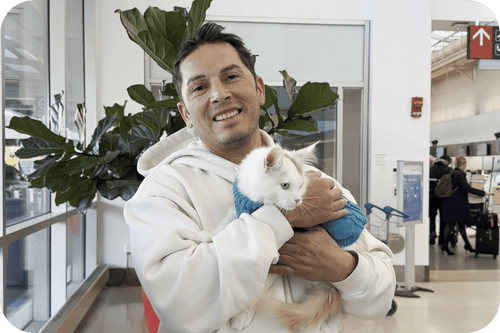
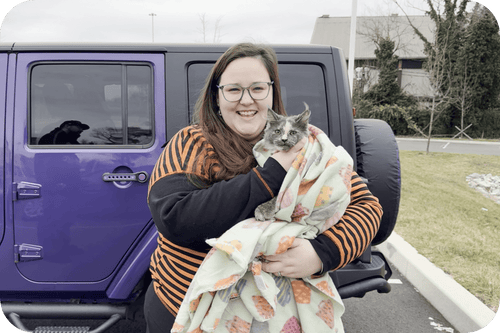
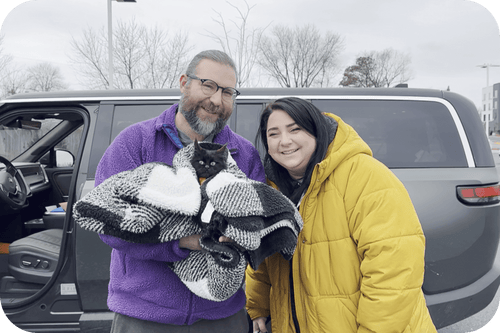
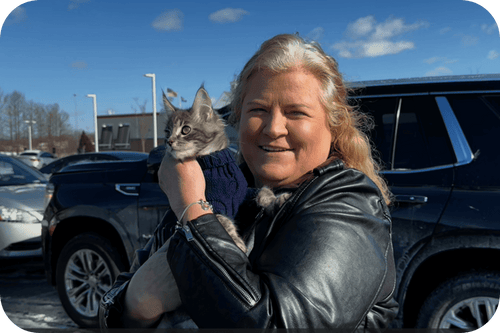
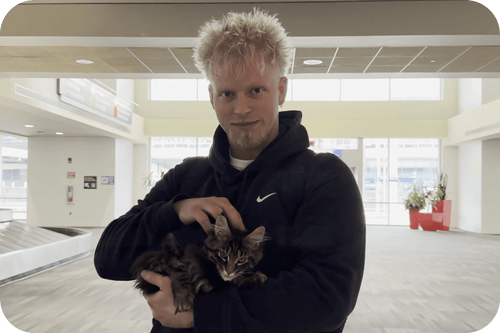
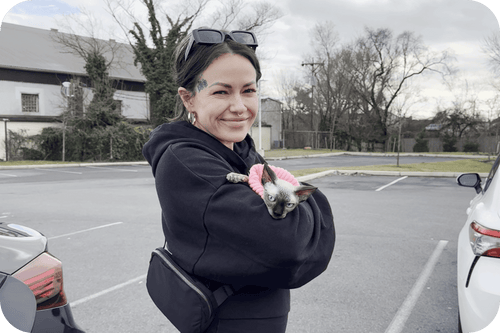
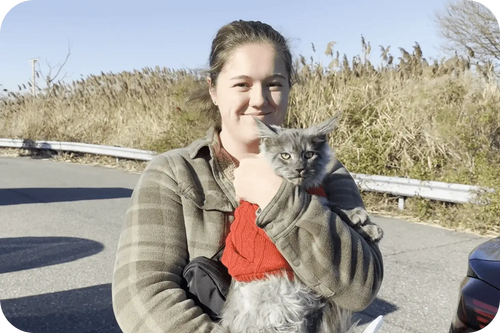
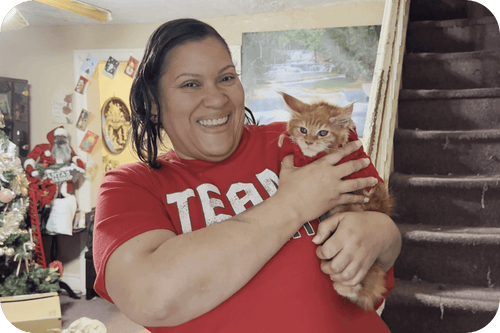
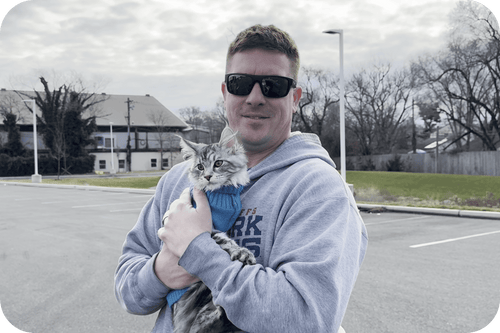
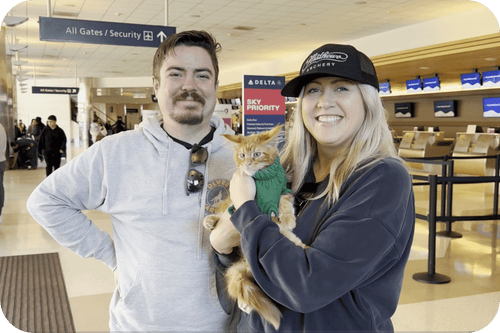
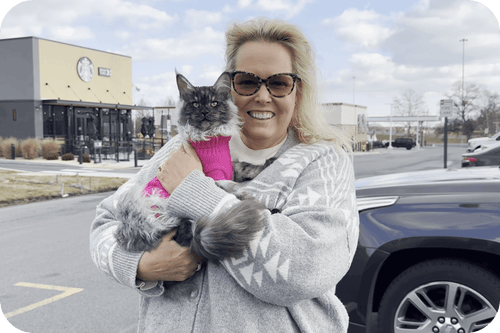
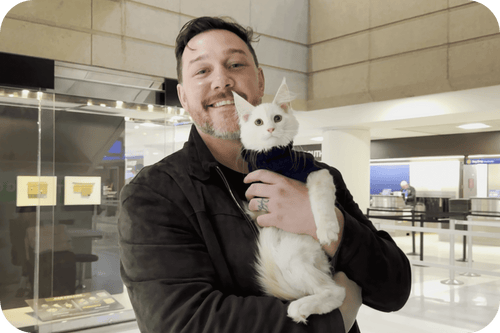
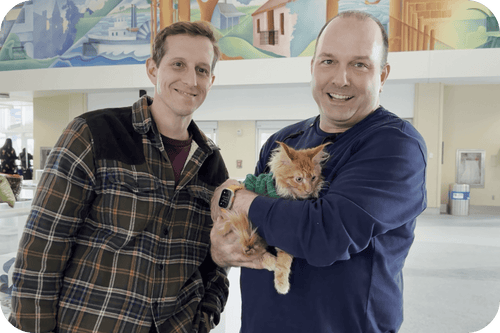
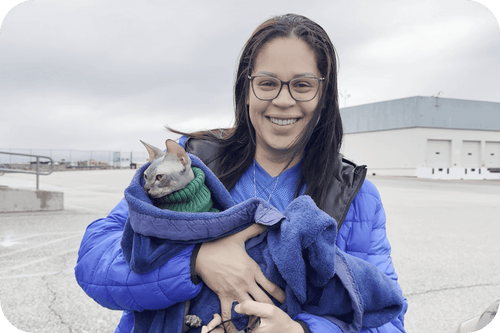
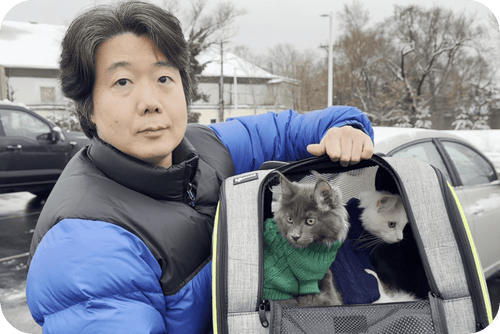
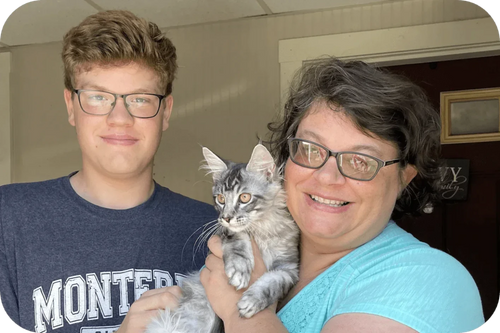
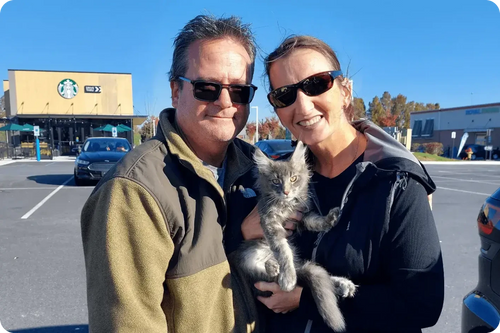
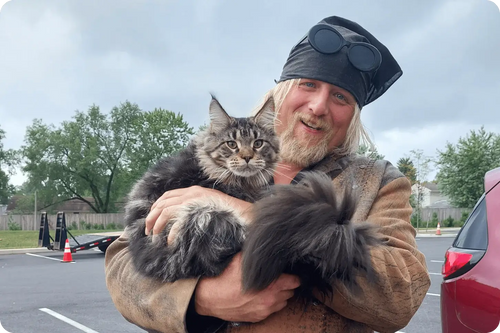

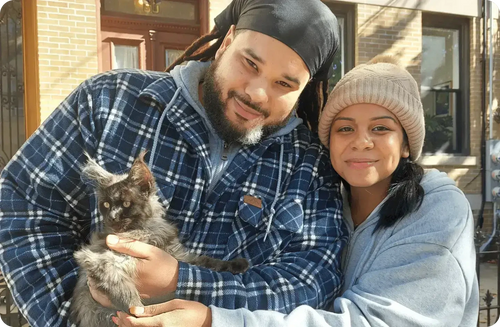
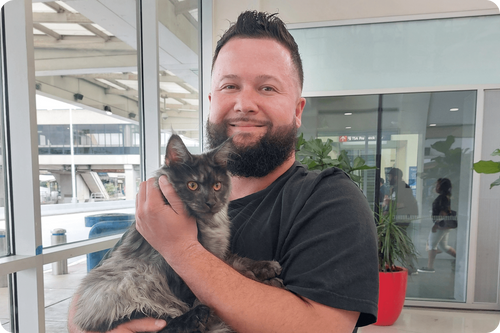













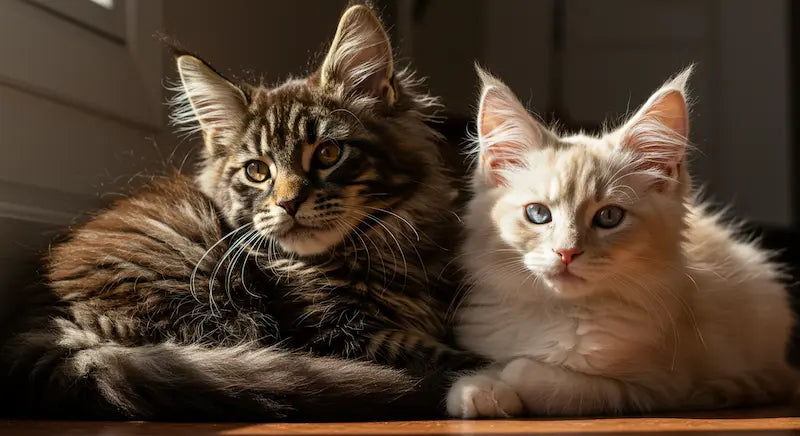
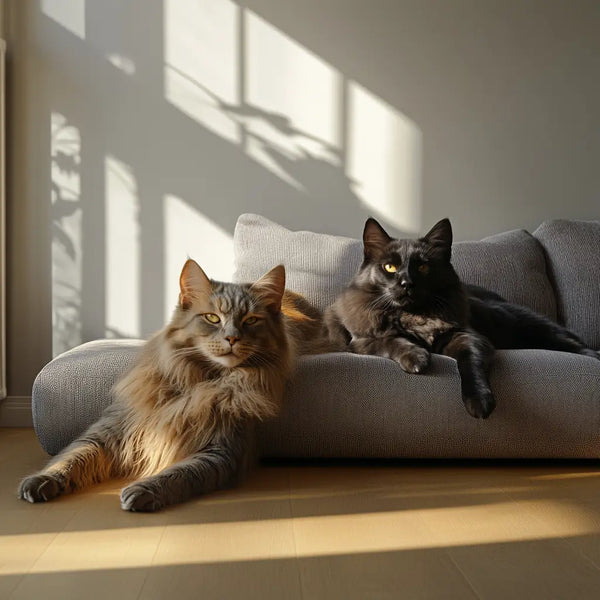





Comments(0)